The NBA has no shortage of rules affecting which players can and can’t be traded at any given time, which complicates our understanding of which players are truly moveable. That’s especially true leading up to the regular season, when players who recently signed free agent contracts, extensions, and rookie contracts all face different sets of trade restrictions.
In an effort to clear things up, we’re looking today at which players around the NBA are currently affected by trade restrictions of one kind or another. Let’s dive in…
Recently signed free agents
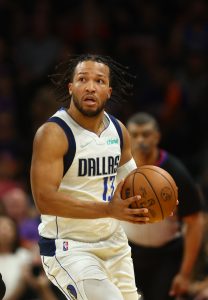 For the most part, a free agent who signed a contract in the offseason is ineligible to be traded until December 15.
For the most part, a free agent who signed a contract in the offseason is ineligible to be traded until December 15.
Currently, our list of players who will become trade-eligible on December 15 features 78 names, including Knicks guard Jalen Brunson, the most notable free agent to change teams this summer. But the list is technically even longer than that, since we haven’t included players who signed Exhibit 10 contracts. Most of those players will be waived by opening night, but if they earn spots on regular season rosters, the December 15 trade restriction would apply to them too.
It’s worth noting that Knicks big man Jericho Sims falls into this category too, despite not being a free agent this summer. A player who has his two-way deal converted to a standard contract during the offseason, like Sims did, also doesn’t become trade-eligible until December 15.
A select group of recently signed free agents won’t become trade-eligible until January 15. These 20 players all meet a specific set of criteria: Not only did they re-sign with their previous team this offseason, but they got a raise of at least 20%, their salary is worth more than the minimum, and their team was over the cap, using Bird or Early Bird rights to sign them.
A free agent who signs after September 15 won’t become trade-eligible until three months after his signing date. So, if a player signs with a team on September 29, he’d become eligible for a trade on December 29. Because the 2023 trade deadline is set to land on February 9, a free agent who signs a contract after November 9 won’t be trade-eligible this season.
The above rules apply to players who sign standard contracts, not two-way deals. A player who signs a two-way contract is ineligible to be traded for 30 days. So Malcolm Hill, who signed with the Bulls on Wednesday, will become trade-eligible on October 7. Two-way players are virtually never traded anyway though.
Recently signed draft picks
Like a player who signs a two-way contract, a draftee who signs his first NBA contract is ineligible to be traded for 30 days. Currently, this restriction only impacts Raptors second-rounder Christian Koloko, who signed on August 26 and will become trade-eligible on September 25.
The rest of this year’s draftees can currently be traded. That list includes all the players besides Koloko who have signed, since more than 30 days have passed since their officially completed their deals.
It also includes those players who remain unsigned, such as E.J. Liddell or Kendall Brown, since their draft rights can be traded until they sign their contract. Once they officially sign, they’ll become trade-ineligible for 30 days.
Players with veto ability
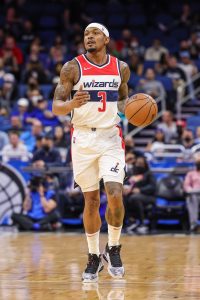 Wizards star Bradley Beal is the only NBA player who has a genuine no-trade clause in his contract, but several other players have the ability to veto trades this season due to various quirks of the Collective Bargaining Agreement.
Wizards star Bradley Beal is the only NBA player who has a genuine no-trade clause in his contract, but several other players have the ability to veto trades this season due to various quirks of the Collective Bargaining Agreement.
The most notable of those players is Suns center Deandre Ayton, whose consent is required because Phoenix matched his offer sheet from the Pacers this offseason. Sixers guard James Harden also has the ability to veto a trade in 2022/23.
The rest of the list, which consists of 16 more names, is significantly less star-studded — Drew Eubanks, Nathan Knight, Theo Pinson, and Luca Vildoza are among the players who can veto trades this season, for example.
Players who have signed veteran extensions
A player who signs a rookie scale extension becomes more difficult to trade due to the “poison pill provision,” but he could theoretically be moved immediately.
That’s not necessarily the case for a player who signs a veteran contract extension. A player who signs a veteran extension that locks him up for more than three total years (including his current contract) and/or includes a raise higher than 5% become ineligible to be traded for the next six months.
With the help of our extension trackers, here are the players currently affected by that rule, along with the dates they’ll become trade-eligible:
Five players who signed veteran extensions in recent months received new contracts that didn’t exceed three total years or include raises greater than 5%, meaning they remain eligible to be traded. Those players are Kentavious Caldwell-Pope (Nuggets), Robert Covington (Clippers), Thaddeus Young (Raptors), Gary Harris (Magic), and Taurean Prince (Timberwolves).
Players who have signed Designated Veteran extensions
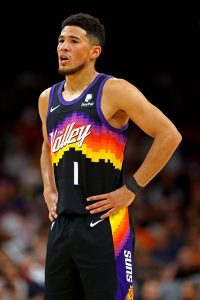 A Designated Veteran contract is also known as a “super-max” deal — it’s a maximum-salary contract that starts at 35% of the cap instead of 30% because the player has met certain performance criteria before achieving 10 years of NBA service.
A Designated Veteran contract is also known as a “super-max” deal — it’s a maximum-salary contract that starts at 35% of the cap instead of 30% because the player has met certain performance criteria before achieving 10 years of NBA service.
A player who signs a Designated Veteran contract or extension can’t be traded for one full year after his signing date.
Three star players have signed Designated Veteran extensions this offseason. Here are those players, along with the dates they’ll become trade-eligible:
Players affected by aggregation restrictions
When a team trades for a player via salary-matching or using an exception (ie. not by absorbing the player into cap room), that team can’t “aggregate” the player in another trade for two months. Aggregating a player means combining his salary with another player’s for matching purposes.
For instance, when the Jazz acquired Patrick Beverley, Malik Beasley, Jarred Vanderbilt, and Leandro Bolmaro in the Rudy Gobert blockbuster on July 6, they were prohibited from aggregating any of those players in a second deal until at least September 6. Utah ultimately moved Beverley on August 25 and was able to do so because he was the only outgoing player in that trade.
Since most of this offseason’s trades were completed in late June or early July, this restriction is no longer affecting many players. By the end of the coming weekend, only a small handful of players will still be ineligible to be aggregated in a trade. Here are those players, along with the dates they’ll become eligible to be aggregated:
Any player who is traded this season after December 9 (without being acquired via cap room) won’t be eligible to be flipped prior to the trade deadline in a second deal that aggregates his salary with another player’s.
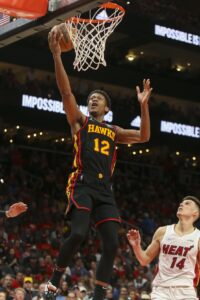 Hunter clearly worked hard on his game entering year two, as he got off to a great start, averaging 17.9 PPG and 5.6 RPG on a stellar .517/.375/.877 (.646 true) shooting line in 17 games (33.3 MPG). Unfortunately, things went downhill from there, as right knee discomfort and swelling ultimately led to arthroscopic surgery and multiple setbacks, causing Hunter to miss all but five games the rest of the regular season.
Hunter clearly worked hard on his game entering year two, as he got off to a great start, averaging 17.9 PPG and 5.6 RPG on a stellar .517/.375/.877 (.646 true) shooting line in 17 games (33.3 MPG). Unfortunately, things went downhill from there, as right knee discomfort and swelling ultimately led to arthroscopic surgery and multiple setbacks, causing Hunter to miss all but five games the rest of the regular season. For the most part, a free agent who signed a contract in the offseason is ineligible to be traded until December 15.
For the most part, a free agent who signed a contract in the offseason is ineligible to be traded until December 15. Wizards star
Wizards star  A
A 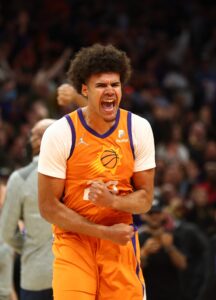 Part of the reason Johnson was rated lower than where he was drafted was that he was an older prospect. After receiving a redshirt for his freshman year, he wound up playing a full four years afterward – he spent his first few college seasons with Pittsburgh before transferring to North Carolina.
Part of the reason Johnson was rated lower than where he was drafted was that he was an older prospect. After receiving a redshirt for his freshman year, he wound up playing a full four years afterward – he spent his first few college seasons with Pittsburgh before transferring to North Carolina.